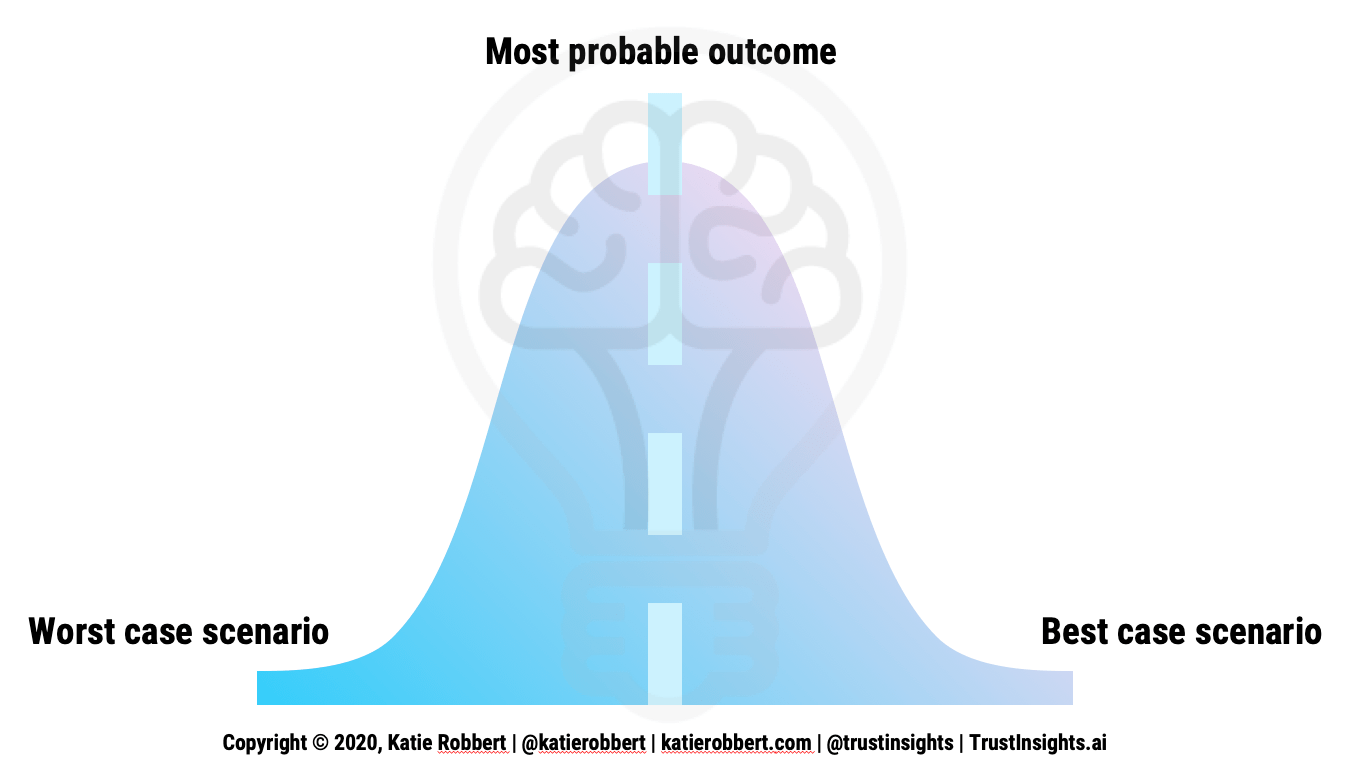What are your three plans?
In many conversations about planning, Katie and I often talk about the different types of plans we’ll need to account for various outcomes. Katie’s favorite style of planning is the three plans:
- Best case scenario
- Worst case scenario
- Most probable scenario
This seemingly straightforward planning framework fits a normal distribution – a bell curve – of outcomes, and is the best way to plan for multiple eventualities.

The question then becomes, what constitutes these scenarios? After all, the worst case scenario could always be an undetected rogue asteroid wipes out all life on Earth tomorrow, but the probability of that happening, while not zero, is fairly close to zero. The realistic answer is to first decide on a goal you’re trying to achieve, then look at your own history and your competitors’ histories to see what has happened, and extrapolate from those results.
For example, suppose you’re launching a new webinar. In the past, you’ve attracted 250 registrants, but you’ve heard through the grapevine that a competitor landed 500 registrants for a similar topic. You’ve now got a sense of what the best case scenario could be – 500 registrants. The worst case probably isn’t zero, but if your worst webinar attracted 10 registrants, then that’s a reasonable potential worst case for this one. And if you took the average of the last 5 webinars you did and they netted out to 275 registrants, you’ve got a most probable scenario.
From this assessment, you can then build plans, resourcing, budgets etc. to achieve each of the scenarios and obtain a decision from your stakeholders about which scenario they want the most. If the head office wants 500 registrants and you’ve outlined the budget and commitment to achieve that, they can now make a rational decision about whether the cost is worth the outcome or not.
Follow the three plans framework for any major decision, and you’ll be able to offer your stakeholders options instead of yes/no decisions that may increase the resources you’re given to work with.

This week’s Bright Idea is our video-first transmedia content framework. (that’s a mouthful, isn’t it?) In an era when creating content is more important than ever but time and resources are more scarce than ever, how do you make the most content possible? Based on a 2008 idea from our friend and former colleague Todd Defren called content optimization, the transmedia framework puts video at the heart of your content strategy.
Read more and download the free PDF here, no form required.

This week’s Rear View Mirror answers a key question from one of our Analytics for Marketers members: how important is domain authority for SEO measurement?
Domain authority, also known as domain strength or domain rating, is an arbitrary SEO metric created by SEO tools to show the relative importance of a domain (such as a blog, publication, etc.) so that you can prioritize which publications to pitch for guest posts, interviews, etc. The key question is, how relevant is it to the outcome we’re after, which in SEO is organic search traffic?
The answer to this question isn’t as simple as it might first look. In an examination of 72,531 articles published YTD on a generic topic (articles using stopwords such as a, and, the, etc. in their headlines and content), we found the following:

We see a correlation of 0.07 between domain rating and traffic, which is no statistical relationship at all. (-1.0 would be an inverse relationship, +1.0 would be a perfect relationship). So, domain rating is a useless measure, right?
Not so fast. When we look at specific niches, domain rating gains significance. Looking at the student financial aid industry, we see the following:

Here we see a correlation of 0.4, which is a moderately strong correlation between domain rating and traffic, strong enough that you’d want to do some testing to prove the relationship.
The key takeaway from this investigation is that one size doesn’t fit all even in our most common marketing metrics. What’s an impactful metric for one industry may be meaningless in another – the only way to determine what’s best for your company is to test, test, test – and that has a hidden strategic benefit. While your competitors rely on overly generic advice, you’ll be operating at a significant advantage with data and insights customized for your industry or niche.
Methodology statement: Trust Insights used the AHREFS SEO tool to export 72,531 articles using the top 25 stopwords in the English language for articles published year-to-date in 2020. Because of the query choice, results are biased towards the English language. For financial aid, Trust Insights used the same tool and methodology with the top keywords in the industry, such as FAFSA, Stafford Loan, FSEOG, etc. for articles published in 2020. We used the Spearman correlation, rho, as the measure of correlation due to the non-normal distribution of data. The timeframe of the study data is January 1, 2020 to February 25, 2020. The date of data extract is February 25, 2020. Trust Insights is the sole sponsor of the study and neither gave nor received compensation for data used, beyond applicable service fees to software vendors.

- 1 Question Survey from Trust Insights (January 2020)
- Instant Insights: The Video-First Transmedia Content Framework
- {PODCAST} In-Ear Insights: Marketing Analytics, Ethics, and Data Privacy
- Staying relevant in your job
- Marketing Analytics, Data Science and Leadership February 17, 2020 Week In Review
- Ask a “Silly” Marketing Analytics Question
- 2020 Data-Driven Marketing Trends Report

Shiny Objects is a roundup of the best content you and others have written and shared in the last week.
Social Media Marketing
- ‘Put everything in the hands of the influencers’: Inside RXBar’s new influencer strategy via Digiday
- Seven Quick Tips for Winning Ways at Social Media on a Tight Budget via Agorapulse
- How to Use TikTok Challenges for Business via Social Media Examiner
Media and Content
- No One Can Break Your Content Rules If They Dont Exist
- Its Time to Put the ‘Marketing’ Back in ‘Content Marketing’
- Audience Research in Marketing: Start With Data You Already Have via Seer Interactive
Tools, Machine Learning, and AI
- This AI Tool Erases People From Live Webcam Feed In Real-Time
- How AI at The Edge & Other IoT Trends Are Transforming Every Industry via ReadWrite
- The future of AI journalism is less hyperbole and smarter readers
Analytics, Stats, and Data Science
- 5 Useful Personal Finance Functions from NumPy Financial via Python and R Tips
- Stop Wasting Time: Review Your Website Analytics
- What Employers Should Consider in Big Data Hiring via insideBIGDATA
SEO, Google, and Paid Media
- Shopify SEO: 10 Easy Tips For More Organic Traffic
- Which of My Competitor’s Keywords Should (& Shouldn’t) I Target? via Best of Whiteboard Friday via Moz
- Schema Markup for SEO via The Complete Guide
Business and Leadership
- How Do We Learn to Actively Listen? A Challenge to All of Us to be More Present with our Dialogic Partners via Institute for Public Relations
- Changing Communities: How to Bring Fairness into Finance via Knowledge@Wharton
- How to Help Your Team Feel Their Purpose at Work via Lolly Daskal |
Got a “Silly” Question?
One of the things we’ve found with friends and colleagues is that you have questions you don’t feel comfortable asking in front of your peers for fear of appearing less knowledgeable. We all have those questions – they start with phrases like, “I really should know this but…” or “I’m so embarrassed to ask this, but…”
So we’ve put up a page where you can ask those questions anonymously, and we’ll answer them here or on our blog, podcast, YouTube channel, newsletter, etc. without ever naming names.
If you’ve got a question that you want to ask privately/anonymously, go ahead and ask it here!
Join the Club
Are you a member of our free Slack group, Analytics for Marketers? Join 800+ like-minded marketers who care about data and measuring their success. Membership is free – join today.
Upcoming Events
Where can you find us in person?
- Agorapulse Social Success Summit 3.0, February 2020, Online
- Social Media Marketing World, March 2020, San Diego, CA
- MarTech West, April 2020, San Jose, CA
- ContentTech Summit, April 2020, San Diega, CA
- HELLO Conference, April 2020, New Jersey
- MadConNYC, May 2020, New York City
- Women in Analytics, June 2020, Columbus, OH
- MAICON 2020, July 2020, Cleveland, OH
Going to a conference we should know about? Reach out!
Want some private training at your company? Ask us!
In Your Ears
Would you rather listen to our content? Follow the Trust Insights show, In-Ear Insights in the podcast listening software of your choice:
- In-Ear Insights on Apple Podcasts
- In-Ear Insights on Google Podcasts
- In-Ear Insights on all other podcasting software
Stay In Touch
Where do you spend your time online? Chances are, we’re there too, and would enjoy sharing with you. Here’s where we are – see you there?
Required FTC Disclosures
Events with links have purchased sponsorships in this newsletter and as a result, Trust Insights receives financial compensation for promoting them.
Trust Insights maintains business partnerships with companies including, but not limited to, IBM, Talkwalker, Zignal Labs, Agorapulse, and others. While links shared from partners are not explicit endorsements, nor do they directly financially benefit Trust Insights, a commercial relationship exists for which we may receive indirect financial benefit.
Conclusion
Thanks for subscribing and supporting us. Let us know if you want to see something different or have any feedback for us!









